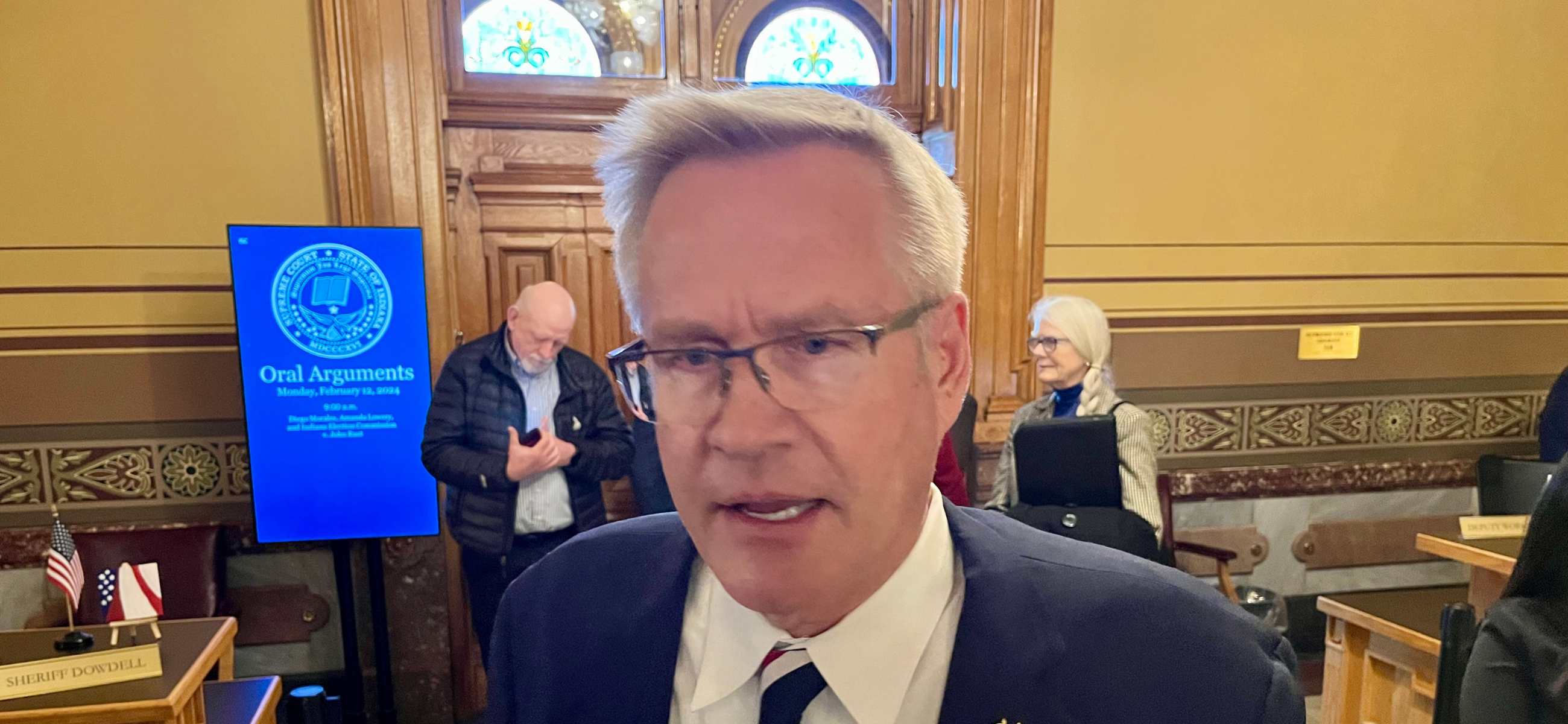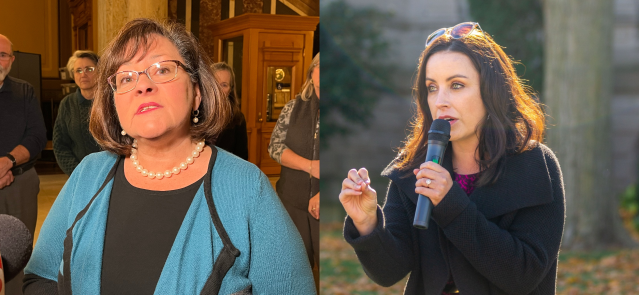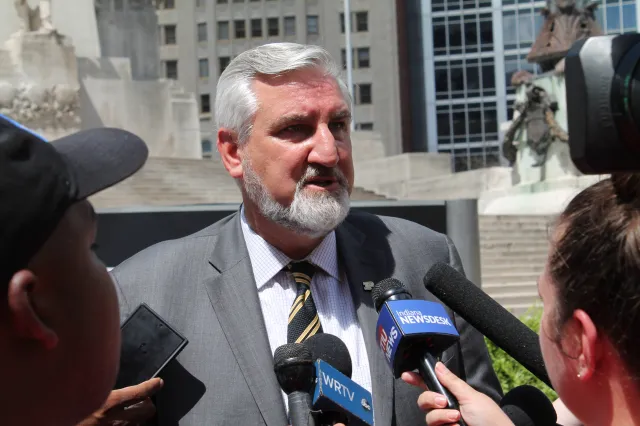Stay ahead of the curve as a political insider with deep policy analysis, daily briefings and policy-shaping tools.
Request a Demo
U.S. Senate candidate John Rust speaks with reporters after an Indiana Supreme Court hearing on his ballot access lawsuit on Monday, Feb. 12, 2024. (Credit: Tom Davies)
Agribusiness executive John Rust faces being kicked off the May primary ballot for the Republican U.S. Senate nomination as the state Supreme Court has upheld the state’s two-primary voting standard for Republican or Democratic candidates.
The court issued a one-page order Thursday saying a majority of the five justices had voted to lift a Marion County judge’s preliminary injunction that blocked enforcement of the law on the grounds that it was unconstitutional.
The order, signed by Chief Justice Loretta Rush, didn’t provide a vote breakdown or explain the court’s decision but said an opinion would be issued later.
The decision came three days after the justices heard oral arguments in Rust’s challenge to the law, which Republicans had cited to prevent his run against U.S. Rep. Jim Banks for the party’s nomination to the Senate seat that Mike Braun is giving up to run for governor.
Rust could face removal from May ballot
A voter, county party chair or another candidate can file a challenge by noon Friday to remove Rust from the ballot. The state Election Commission must consider challenges no later than Feb. 29.
Rust said he wasn’t giving up his legal battle and was considering an appeal to the U.S. Supreme Court.
Rust told State Affairs he believed he still had a chance with arguments that federal courts haven’t upheld party-voting requirements as long as the Indiana law, which amounts to a four-year standard for those such as himself who live outside city limits and, thus, have elections only in even-numbered years.
“Right now, in effect, they’re allowing county [party] chairs in Indiana to decide who the next United States senator is rather than the people,” Rust said.
The Banks campaign didn’t immediately reply to a request for comment from State Affairs.
At issue is a state law adopted in 2021 requiring candidates appearing on Republican or Democratic primary ballots to have chosen that party’s ballot in the two most recent primaries in which they voted. Or candidates can provide certification of party affiliation from their county party chair.
Republicans sought to block Rust’s run
Rust, the former board chairman of the Seymour-based egg producer Rose Acre Farms, acknowledged he voted in Democratic primaries in 2010 and 2012 before voting in the 2016 Republican primary. Jackson County Republican Chair Amanda Lowery has said she would not certify Rust as a Republican, citing his previous Democratic primary votes.
Rust maintains he’s always been a Republican but voted in Democratic primaries for candidates he knew personally and had no way of knowing at the time of the 2020 primary that the state law would be changed from the previous single-primary voting standard.
His lawsuit argued that the two-primary requirement violated constitutional rights of free speech, association and equal protection.
Rust had given $2.5 million of his own money toward his Senate campaign but faced steep odds in a primary against Banks, who has the backing of former President Donald Trump, the state Republican Party and several national conservative groups.
The Supreme Court and the state Court of Appeals had not ruled on the merits of previous lawsuits challenging the ballot access law, with the appeals court ruling in one case that the candidate didn’t file his lawsuit until too close to when ballots were being printed.
This story has been updated with comment from John Rust.
Tom Davies is a Statehouse reporter for State Affairs Pro Indiana. Reach him at [email protected] or on X at @TomDaviesIND.
X @StateAffairsIN
Facebook @stateaffairsin
Instagram @stateaffairsin
LinkedIn @stateaffairspro
Six things to know about the Fourth of July holiday in Indiana
Barbecue, fireworks and the outdoors are all on the menu for the Fourth of July holiday in Indiana, but it won’t be a good time to visit the Bureau of Motor Vehicles or mail an important package. State and federal agencies will be observing the holiday along with the rest of us, but many of …
Democrats to select attorney general candidate at upcoming convention
Indiana Democratic Party delegates will choose between two candidates for the party’s attorney general nomination at their July 13 convention. Destiny Wells, a defense attorney and U.S. Army Reserve officer who ran unsuccessfully for Indiana secretary of state in 2022, and Beth White, former Marion County clerk and president of the Indiana Coalition to End …
With Indiana ban in place, thousands seek abortions in neighboring states
After a traumatic first pregnancy that culminated in a hospital stay for both herself and her twin daughters in 2013, Sarah did not intend to have more children. She took precautions. They weren’t enough. Sarah, whose name State Affairs has changed to protect her identity, learned of her second pregnancy after she became ill in …
Holcomb’s stance on marijuana unchanged ahead of expected reclassification
Gov. Eric Holcomb on Thursday said his stance on marijuana had not changed ahead of the drug’s expected reclassification. Indiana is among 12 states that have not legalized marijuana for medical or recreational use. Neighboring Illinois, Michigan and Ohio are among the 24 states that have legalized recreational and medical marijuana use. Kentucky is one …




